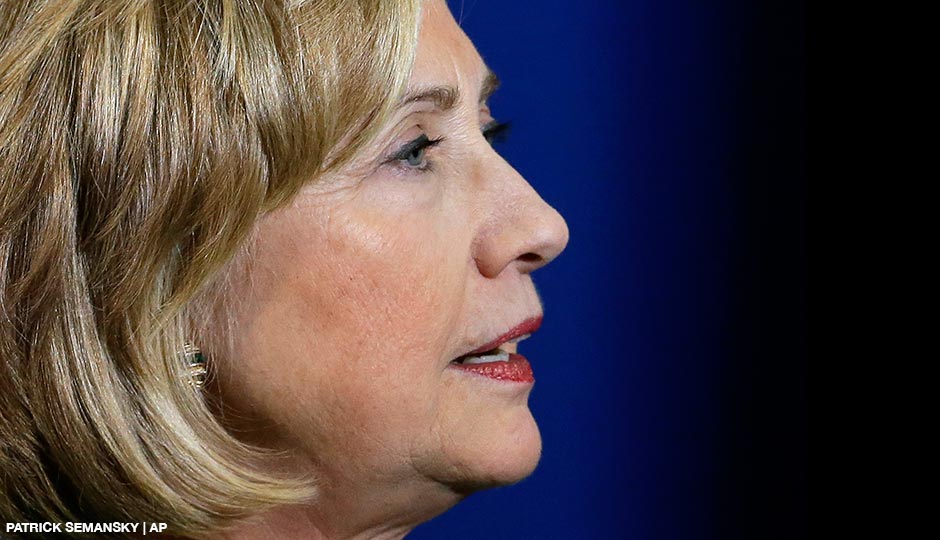I Can’t Get On Board the Hillary Clinton Bandwagon. Yet.

Hillary Rodham Clinton campaigns for Maryland Democratic gubernatorial candidate, Lt. Gov. Anthony Brown, during a rally at the University of Maryland, Thursday, Oct. 30, 2014, in College Park, Md.
Man, I wish I could jump on board the Hillary Clinton bandwagon.
I’d love to be rooting for the First Woman President right now. I’d love to reward a career spent largely in public service. And I’d love to not risk being even tenuously associated with all the sexist d-bags and Clinton Conspiracymongers who are already coming out of the woodwork, again — not that they ever really went away.
What’s more, I’d like not to have to argue with a bunch of left-of-center friends who would clearly like skeptics like me to shut up and fall in line.
But I can’t quite do it. Not yet.
Yes, if she wins the Democratic nomination — and next year’s convention in 2016 right now is shaping up as a coronation of sorts — I’ll probably vote for her. We’re not at that point, yet, though, and until then, well, I wouldn’t be upset if she had to go through a reasonably contested primary election.
Why? Three reasons:
• Iraq. I’ve never been convinced that Hillary Clinton genuinely thought the American invasion of Iraq under President George W. Bush was a brilliant idea. Nonetheless, she did vote to give him authority to wage that war. I’ve always suspected that she did so precisely to preserve her viability as a future presidential candidate — never imagining that a largely anti-war Democratic Party would find an alternative to her, like it did in 2008 with the fashionably anti-war Barack Obama.
The problem: The Iraq War remains one of the biggest foreign policy disasters in American history, an unforced error whose ramifications continue to reverberate, horrifically, through the region. She made a bad choice, one of the worst possible for her generation of leaders. Ick.
• Wall Street: The Bill and Hillary Clinton version of Democratic Party dogma eschewed the old class wars and embraced capitalism to a remarkable — even necessary — degree. But the Clintons have never seemed to find a practical balance between warming up to Wall Street and old-school economic populism. Hillary Clinton sometimes talks about economic inequality, but it feels a bit like a costume she’s putting on.
Much more convincing? This report from the conservative Washington Free Beacon: “Goldman Sachs employees and political action committees have donated $711,490 to Hillary Clinton’s campaigns over the course of her career — more than every other organization except Citigroup.” It’s easy to agree with one New Hampshire critic who suggests Clinton is “fundamentally a person for Wall Street and not the people.”
• Civil liberties: To be fair, I’m not quite sure where Hillary Clinton stands on questions of using drones to assassinate Americans abroad or using the NSA to conduct nearly unlimited surveillance. What I do know is that she served as Secretary of State — a key part of the national security team — in a government that permitted such things. My inclination, then, is not to trust her so much.
When she announced her run for the presidency on Sunday, I asked on Twitter why a person with my objections — which seem to be well within the Democratic mainstream — should give Clinton my support. The theme that emerged most clearly? Hillary has the leadership chops.
“I know what I’m getting,” said one correspondent: “A tested leader who can do the job today.”
That sounds good, but a crucial thing about leadership is knowing the right direction to lead. It’s on that count that I have doubts about Hillary Clinton.
Don’t get me wrong: If she wins the nomination, she’ll almost certainly be the superior choice for liberals come November 2016. You don’t just elect a president when you vote for president, after all; you’re helping shape the Supreme Court for generations to come, and that’s perhaps where the differences between Democratic and Republican presidential candidates are most salient. Liberals have learned the hard way that a Nader-esque protest vote in such situations probably isn’t the responsible way to proceed. Perfection is elusive in politics; sometimes you do with the best you can.
But primary election season is about finding the best candidate and making them prove themselves, not merely accepting the inevitable. I’ll probably get on board the Hillary Clinton bandwagon. Just not yet.
Follow @JoelMMathis on Twitter.


